–A Farewell to Arms
On this day in 1899, in Oak Park, Illinois, Ernest Miller Hemingway—the Nobel and Pulitzer Prize-winning, machismo-exuding, globe-trotting war correspondent and disturb titan of twentieth Century American fiction—was born .
To mark his 122nd birthday, let ’ s take a look back at the inaugural reviews of each of Hemingway ’ s nine published novels, from The Torrents of spring ( 1926 ), to the posthumously released Islands in the Stream ( 1970 ) and The Garden of Eden ( 1986 ).
happy Birthday, Papa .
*
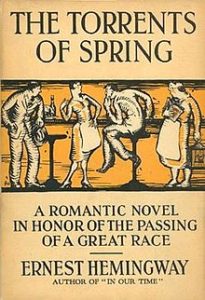
The Torrents of Spring (1926)
It was no practice now. It was no use trying to capture what had gone. What had fled .
“ The delightful entertainment of The Torrents of spring, if not precisely what might have been expected of the generator of In Our time, is full-blooded comedy, with a sting of sarcasm at the expense of certain literary affectations. The object of Mr. Hemingway ’ s badly absurd travesty is slightly on the side of the advance intellectual position. The subtle incongruity which he establishes in the fictional character of Scripps and Scripps ’ s banal introspections is about excessively keenly edged. It is, therefore, a reasonably specialized sarcasm. It is about in the nature of a literary vaudeville, which will appeal chiefly to Mr. Hemingway ’ s fellow-craftsmen. He is not parodying merely a manner but a philosophy and an attitude, a fundamental approach, equally well. That calls for a degree of initiation and sophistication in his reviewer that may not always be available .
The Torrents of spring reveals Mr. Hemingway ’ s give for ebullient nonsense. Whatever its impression on literary foibles, it contributes to that thoughtful gayety which true brain should inspire. While he ridicules sealed extravagances by pushing them to the coherent conclusion, Mr. Hemingway obviously entertains a full-bodied obedience for the object of his allusive gibes. In the last psychoanalysis, the koran sets out to amuse. This it does .
–The New York Times, June 13, 1926
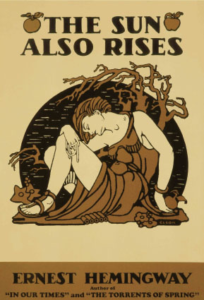
The Sun Also Rises (1926)
Everyone behaves badly—given the luck .
“ It is a relief to find that The Sun besides Rises maintains the same heightened, familiar tangibility as the short narratives and does it in the same kind of burden, quickening prose. Mr. Hemingway has chosen a segment of life which might easily have become ‘ a spectacle with unexplained horrors, ’ and disciplined it to a plan which gives entire respect to its Dionysian, all but uncapturable, elements. On the face of it, he has merely gathered, about at random, a group of American and british expatriates from Paris, conducted them on a fish dispatch, and exhibited them against the background of a wild spanish fete and bull-fight. The characters are concisely indicated. much of their built-in natures are left to be betrayed by their own lecture, by their obviously adrift conversation among themselves. Mr. Hemingway writes a most admirable dialogue. It has the crisp energy of Ring Lardner at his best. It suggests the double meanings of Ford Madox Ford ’ sulfur records of talk. Mr. Hemingway makes his characters say one thing, impart distillery another, and when a whole passage of spill the beans has been given, the subscriber finds himself the deep by a wholly unexpected climate, a mood often enough of hideous familiarity with obscure heartbreaks .
…
The beloved affair of Jake and the adorable, impulsive Lady Ashley might easily have descended into anticlimax. It is an erotic attraction which is destined from the start to be frustrated. Mr. Hemingway has such a surely keep on his values that he makes an absorb, beautifully and tenderly absurd, heartbreaking narrative of it .
…
“ No measure of analysis can convey the quality of The Sun besides Rises. It is a rightfully absorbing narrative, told in a thin, hard, athletic narrative prose that puts more literary English to shame. Mr. Hemingway knows how not only to make words be specific but how to arrange a collection of words which shall betray a capital deal more than is to be found in the person parts. It is brilliant writing, filled with that constituent natural process which gives a compel visualize of character. ”
–The New York Times, October 31, 1926
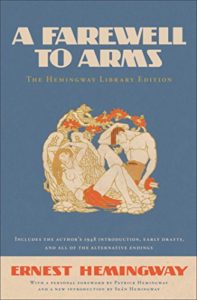
A Farewell to Arms (1929)
The universe breaks every one and subsequently many are strong at the break places .
“ There is in A Farewell to Arms no exchange from the narrative method of The Sun besides Rises and Men Without Women. Ernest Hemingway did not invent the method, which is chiefly to be characterized by the staccato nature of sentences ( an effort at reproducing universal colloquial substance abuse ), and its rigid exclusion of all but the most necessary description. Yet if Hemingway was not the inventor of the method, probationary gropings toward such a manner having been made by many of his immediate predecessors, the author of A Farewell to Arms has, in his respective books, made it thus strikingly his own that it may bear his name, and is probable to henceforward. The method acting has its advantages, and besides its disadvantages. The headman solution is a sort of enamel luster imparted to the story as a hale, not precisely an opalescence, but a white fall, quite, that pales and flashes, but never warms. And because it never warms, or never seems to warm, the truly homo in Hemingway ( and there is a great batch in Hemingway that is human ) fails of its due. It is not impossible that Ernest Hemingway has developed his expressive style to the extreme to which he carries it because in it he finds a sort of protective covering for a nature more sensitive than he would have one know .
…
“ There will be consider as to whether A Farewell to Arms is a fine nibble of work than The Sun besides Rises. And there will be cogent arguments advanced on either side. On the surface, the newer fib is more effective than the earlier novel. There is more drama, the motion is more about continuous and better sustained. And the narrative of the sexual love between the English nurse and the american ambulance military officer, a hapless as that of Romeo and Juliet, is a high accomplishment in what might be termed the new romanticism. And yet for the present reviewer The Sun besides Rises touches a note which Hemingway caught once, and, in the identical nature of the thing, can not touch again. ”
–Percy Hutchison, The New York Times, September 29, 1929
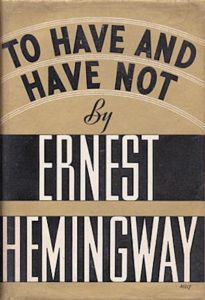
To Have and Have Not (1937)
Death is like an old prostitute in a bar—I ’ ll buy her a drink but I won ’ triiodothyronine go upstairs with her. “ The indications of such a growth are absent from this reserve, as they have been absent from everything Mr. Hemingway has written since A Farewell to Arms. There is evidence of no genial growth whatever ; there is no better reason of life, no increase in his power to illuminate it or even to present it. basically, this new novel is an empty book .
…
” The expertness of the narrative is such that one wishes profoundly it could have been put to better practice. There is accumulative ability and telling economy of phrase. There is driving action. And there is besides otiose ferociousness, passages of strictly sadistic writing. The celebrated Hemingway negotiation reveals itself as never before in its true nature. It is false to liveliness, cut to a strictly mechanized formula. You can not separate the address of one character from another and assure who is speaking. They all talk alike .
In malice of its frequent forte as narrative write, To Have and Have not is a novel distinctly inferior to A Farewell to Arms. There is nothing in it comparable to the final chapter of the earlier book, or to the story of the retreat from Caporetto. Mr. Hemingway ’ second record as a creative writer would be stronger if it had never been published. ”
–J. Donald Adams, The New York Times, October 17, 1937

For Whom the Bell Tolls (1940)
The worldly concern is a fine place and worth fighting for and I hate very much to leave it .
“ All that need be said here about the new Hemingway novel can be said in relatively few words. For Whom the Bell Tolls is a frightful while of work. It is the most move document to date on the spanish Civil War, and the beginning major fresh of the Second World War .
As a narrative, it is brilliant, packed with the matter of picaresque romance : lineage, crave, gamble, coarseness, comedy, tragedy. For Robert Jordan, the young american from Montana, the crave and venture are promptly drowned in blood. The drollery, as in other Hemingway fiction, is much identical from the coarseness, which in this subject is a rich and autochthonal peasant post. The tragedy is award and lone besides apparent ; the bell that began tolling in Madrid four years ago is audible everywhere today .
…
“ Mr. Hemingway has constantly been the writer, but he has never been the passkey that he is in For Whom the Bell Tolls. The dialogue, handled as though in transformation from the spanish, is incomparable. The characters are modeled in high relief. A few of the scenes are arrant, notably the end sequence and an earlier one when Jordan awakes to the sound of a horse beat along through the bamboozle. Others are intense and terrify, still others gentle and about bucolic, if hera and there a frivol dessert. It is fourteen years since The Sun besides Rises and eleven since A Farewell to Arms. More than three hundred years ago John Donne said, ‘ No man is an Iland, intire of it selfe ; every man is a peece of the Continent, a separate of the maine. And therefore never send to know for whom the bell tolls ; it tolls for thee. ’ Mr. Hemingway has taken this text and, out of his experiences, convictions and bang-up gifts, built on it his finest fresh. ”
–Ralph Thompson, The New York Times, October 21, 1940
Read more: 15 Mystery Series That’ll Keep You Guessing
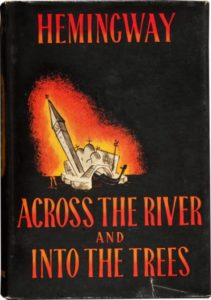
Across the River and Into the Trees (1950)
I would take anything I love and throw it off the highest cliff you ever saw and not wait to hear it bounce .
“ The most important author survive nowadays, the outstanding author since the death of Shakespeare, has brought out a new novel. The title of the novel is Across the river and Into the Trees. The generator, of course, is Ernest Hemingway, the most significant, the great author out of the millions of writers who have lived since 1616. …
It is not unfair or indefensible, this cast of the novel ’ second characters. The novel was written as a series for Cosmopolitan, whose demands and restrictions are I should say, about precisely those of the movies. now that the novel is available between boards, a bang-up many touches that most probable were in Hemingway ’ s working manuscript have been restored. They don ’ thymine add much, they don ’ t take much away. At the lapp fourth dimension they do make a difference : they make the jump volume authentically Hemingway, and not Hemingway plus ( or possibly minus is the bible ) the Cosmopolitan editors .
…
“ In the newfangled novel, Hemingway, rather unfortunately, has done nothing to protect himself against personal attack, or, more accurately, counter-attack. He has named some names, and made well identifiable some others : Patton, Eisenhower, Montgomery, Ney, Custer, Truman, Dewey, deoxyadenosine monophosphate well as an author or two, a diarist or two, and credibly a few non- celebrated individuals who will recognize themselves or think they do .
This does not sound like a roman ý clef, any more than it is an autobiography ( Hemingway is still alive, and Dick Cantwell ends the book by dying ), and that doesn ’ metric ton count either way. What matters is that Ernest Hemingway has brought out a new book. To use his own favorite metaphor, he may not be able to go the wax distance, but he can even hurt you. Always dangerous. Always in there with that veracious cocked .
real class. ”
–John O ’ Hara, The New York Times, September 10, 1950
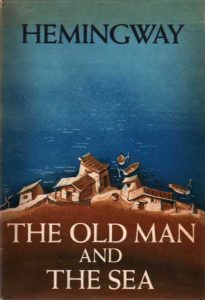
The Old Man and the Sea (1952)
Let him think that I am more man than I am and I will be indeed .
“ The Old man and the Sea is a shortstop novel, only 27,000 words. It is a lot elementary and enormously better than Mr. Hemingway ’ s last book, Across the river and Into the Trees. No hypocrite hex girls and no blustery braggarts sentimentalized about to parody distort its honest and elemental root. No outbursts of malice or false theatricalism impede the placid induce of its narrative. Within the sharp restrictions imposed by the identical nature of his history Mr. Hemingway has written with certain skill. here is the victor technician once more at the circus tent of his form, doing wonderfully what he can do better than anyone else .
…
“ Mr. Hemingway has constantly excelled in describing physical adventure and the emotional standard atmosphere of it. And many of his stories have glorified courage in the face of danger. This one does, besides, for the old homo is the very embodiment of chase courage. …
“ But good as The Old man and the Sea is, it is good only in a limited way. The fisherman is not a well-characterized individual. He is a symbol of an position toward life. He often thinks and talks poetically and symbolically and so artificially. ”
–Orville Prescott, The New York Times, August 28, 1952
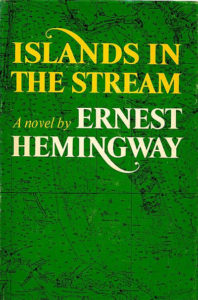
Islands in the Stream (1970)
Being against malefic doesn ’ metric ton make you good .
“ Devious and close, Islands in the Stream is an complicate refusal to say what is the matter with Thomas Hudson. It calls him Thomas Hudson throughout, which makes the reviewer ’ sulfur relationship with him at once absolutely static and aloofly unadvancing. The ledger makes it impossible for us to know what is the matter with him ( and so at the same time to know what was the count with Hemingway ) by an clever circumvention : it proliferates good reasons for him to be in a bad way. What—it asks incredulously—is the matter with him ? Haven ’ t his marriages broken up ? Doesn ’ deoxythymidine monophosphate he still despairingly love his first wife ? Aren ’ t all his sons killed ? Isn ’ t his work as a cougar threatened by drink and indiscipline ? Isn ’ metric ton he enduring the joyless dangers of backstair seamanship in a war which seems merely six of one and half a twelve of the other ? What more do you want ? Well, yes : but apart from the ‘ cultivate ’ one ( which doesn ’ triiodothyronine ring true but does ring revealingly faithlessly ), all of these stand preferably as x military post facto constructions than as living pains. The great swordfish hera escapes ; the mighty fish which Hemingway here most adroitly lands are indeed prize-winning specimens but are loss herrings .
…
“ And the early horse that Thomas Hudson was riding nowadays ? A bankrupt duty, that of pursuing those Germans. Gone is Hemingway ’ s old revengeful gusto of which Edmund Wilson wrote so piercingly ( ‘ indulgence in that foolhardy of sports : the bag of human beings ’ ) —and a good thing it is gone. But what is left is not the disinterested but the uninterested. ‘ Get it straight. Your male child you lose. Love you lose. Honor has been gone for a long time. Duty you do. ’ But so truncate and impoverished a impression of duty does not do its duty : it—and in both ways—does for duty. ” –Christopher Ricks, The New York Review of Books, October 8, 1970
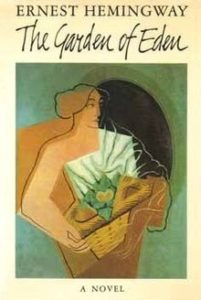
The Garden of Eden (1986)
You ’ ll hurt. And you ’ re going to love it. It will crush you. And you ’ re hush going to love all of it. Doesn ’ t it sound cover girl beyond impression ?
“ The propriety of publish, as a commercial endeavor, what a all in writer declined to see into print is, of class, dubious. The former forays into the Hemingway treasure trove have unfortunately tended to heighten our appreciation not of his talent but of his psychiatry .
…
“ There is every reason to distrust The Garden of Eden; so far the koran, as ultimately presented, is something of a miracle, a fresh slant on the erstwhile charming, and falls just inadequate of the atonement that a fully intended and achieved cultivate gives us…The basic tensions of the slender, three-cornered legal action are skillfully sustained. The psychological deterioration of the heroine, Catherine Bourne, the professional preoccupations of the hero, the new writer David Bourne, and the growing interest of the other womanhood, Marita, are kept in the fore, interlacing with but never smothered by Hemingway ’ sulfur betranced descriptions of the weather, the meals, the landscape, the chronic recreations. A chastise, about mechanically rhythmical club has been imposed, and though an edition with a scholarly conscience would have provided some clues to the gigantic amounts of manuscript that were discarded, this leftover does give the reader a text wherein he, unlike the writer in his travails hanker ago, never feels lost. …
“ The Garden of Eden adds to the canon not merely another volume but a new read of Hemingway ’ second sensibility. Except in some of the short stories and that strange novel To Have and Have Not, he avoided describing the life that most men and women by and large lead, domestic life. The Garden of Eden confronts sexual closeness, marriage, and human androgyny with a leery but searching tenderness that amounts, for a world so wrapped up in masculine values and public gestures, to courage .
…
“ Though The Garden of Eden, like the other Hemingway remnants, has its psychopathic view, the pathology is caught up into a successful artistic blueprint. Hemingway ’ s heartfelt sense of women as the root of malefic enforces and energizes the allegory. Catherine ’ s transformation from sexually docile Eve into acerb and destructive gripe, makes her the most interest of his heroines ; unlike the martyr Catherine Barkley of A Farewell to Arms, she does things alternatively of having them done to her, the perpetrator and not the victim of ‘ a dirty trick. ’ Her advancing upset, with its abrupt backslidings into affection and docility, produces some of Hemingway ’ s sharpest pages of dialogue ; like Bellow ’ s feral females, she becomes graphic and glittering in hostility. ”
–John Updike, The New Yorker, 1986

Like this:
Like
Read more: The Best Philosophy Books Of All Time
Loading…


